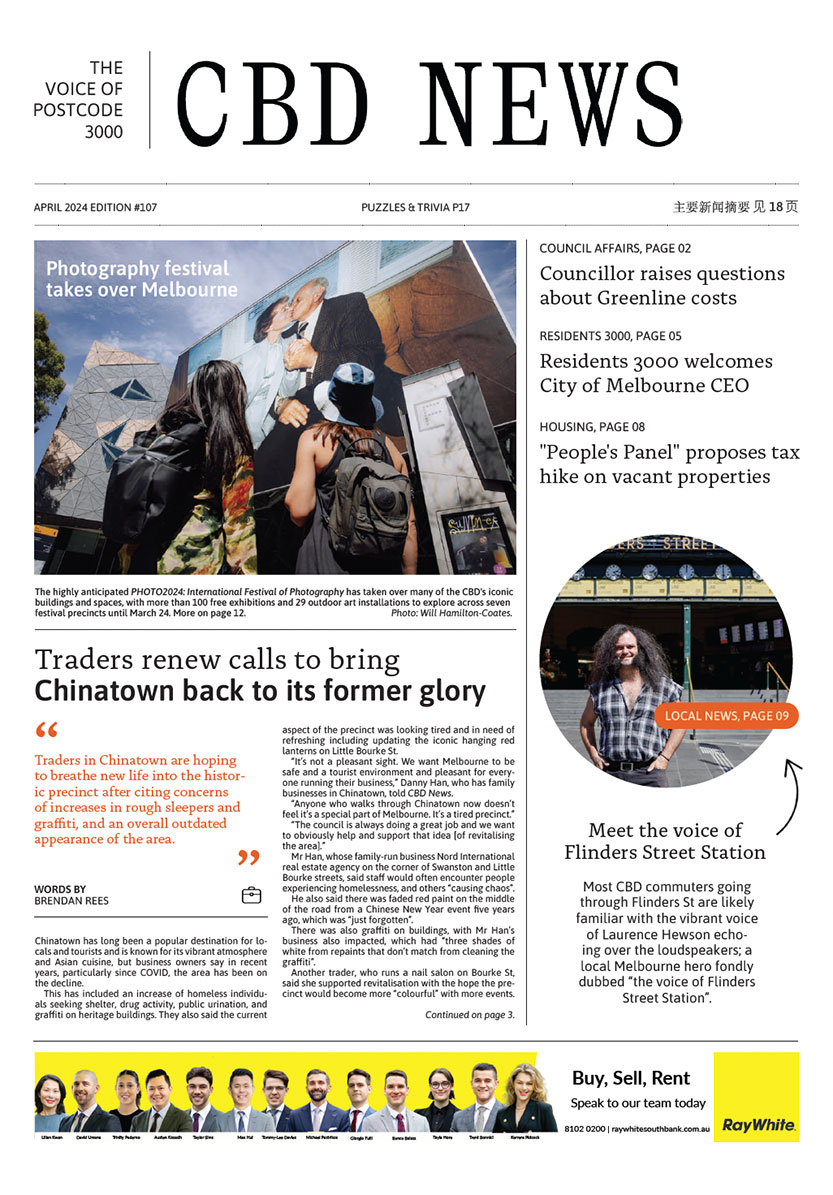Lifestyle rules in the CBD
It’s official: People love living in the CBD because of its lifestyle, but hate the noise.
Results from Residents 3000’s CBD Living Survey show that “lifestyle” is by far the most popular reason people like living in postcode 3000.
Of the 237 respondents, more than half (52.7 per cent) nominated lifestyle, with a further 32.9 per cent opting for “convenience”. “Proximity to work” scored 10.1 per cent of votes and “cafes” was the least popular selection with only 4.2 per cent.
The survey was conducted last year in conjunction with local real estate agents Hocking Stuart.
Asked what they liked least about CBD living, respondents were given a wide range of choices: Noise, graffiti, homeless people, rubbish, buskers, nightclub hours, security, short-term leasing and other.
“Other” scored the highest with 28.6 per cent, with “noise” the next most popular complaint at 20.2 per cent.
Homeless people came in next with 11.8 per cent, followed by rubbish (11.8 per cent), nightclub hours (8.8 per cent), short-term leasing (7.1 per cent), graffiti (4.6 per cent), security (4.2 per cent) and buskers (3.8 per cent).
The issues that people feel most strongly about are “infrastructure/planning” (70 per cent rated this as “very significant”) and “conservation of heritage buildings” (67.2 per cent said “very significant”).
Asked how they thought the city could be improved, many respondents took a negative approach and listed things they wished were banned.
High among these were planning-related issues such as apartment standards, late night garbage trucks and other noise-related complaints. Plane trees and smokers are unpopular.
“If the city wants more people to seriously consider living in the CBD, this all-night-long awful garbage truck noise situation needs to be resolved. It’s embarrassing for Melbourne,” one respondent said.
There was widespread support for increased pedestrianisation, fewer cars, extended bicycle paths, open space, greening the city and opportunities for social interaction.
One novel suggestion was: “A special lane for people texting, as they impede progress in the street.” More than one called for public education and signage to encourage pedestrians to walk on the left-hand side of the footpath.
One person wants the council to trap and kill Indian myna birds. “Where are the magpies, kookaburras, currawong, owls? Killed off by the pack-hunting scavenging Indian mynas.”
Another said the City of Melbourne should promote “quiet nights” – “where there is a positive awareness that the tens of thousands of rate-paying residents are given the opportunity of a good night’s sleep.”
Despite their complaints, the vast majority of residents don’t intend to leave. Some 70 per cent said they were here for the long-term, with only 8.2 per cent identifying as short-term.
Respondents were typically over 50-year-old, owner-occupiers who had lived in the CBD for more than five years.
Some 62.4 per cent were owner-occupiers, 24.8 renters and 12.6 per cent investors. 24.8 per cent had lived in the city for more than 10 years and 24 per cent between five and 10 years.
61 per cent of respondents said they worked in the city and walking was the most common form of transport for more than half of the people surveyed. 48.5 per cent were 50 years or older.
Residents 3000 president John Dall'Amico said the survey was conducted to ensure his organisation was in touch with residents' concerns and issues.
"We needed to be sure that the issues we are taking on resonate with the wider CBD community. Otherwise, we would waste time and resources," Mr Dall'Amico said.
Hocking Stuart principal Scott McElroy said he hoped city living could be improved as a result of the survey.
“Better quality CBD living helps everyone,” he said. “It benefits the long-term sustainability of the market place.”
“A safer CBD offering even better lifestyle results in a better suburb. Everyone benefits – owners, renters and investors.”
Mr McElroy encouraged locals to speak to each other when they meet in the lift.
“The lift is the pedestrian walkway in a vertical street,” he said. “If you like living here, get involved. Say ‘hi’ to your neighbours.”
“We’re about selling the city, not just the properties in it,” Mr McElroy said.

“Swanston Triangle” to undergo green renewal






 Download the Latest Edition
Download the Latest Edition